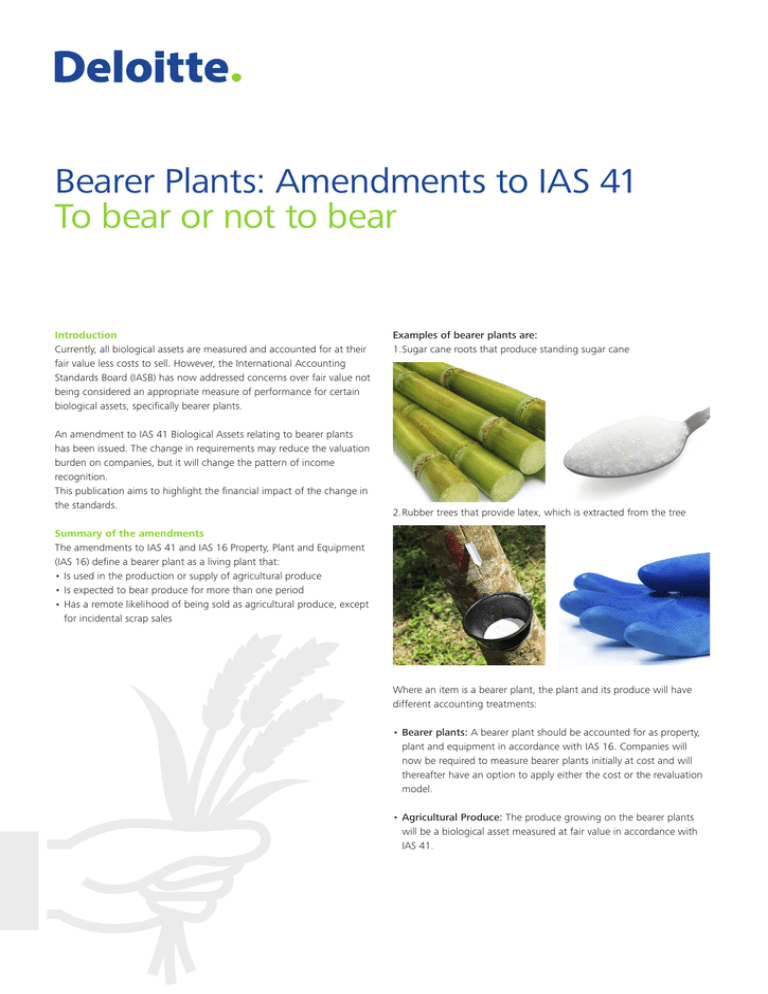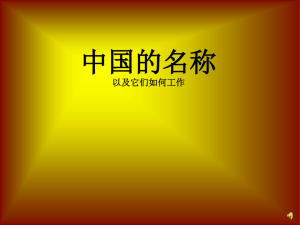
Bearer Plants: Amendments to IAS 41
To bear or not to bear
Introduction
Currently, all biological assets are measured and accounted for at their
fair value less costs to sell. However, the International Accounting
Standards Board (IASB) has now addressed concerns over fair value not
being considered an appropriate measure of performance for certain
biological assets, specifically bearer plants.
An amendment to IAS 41 Biological Assets relating to bearer plants
has been issued. The change in requirements may reduce the valuation
burden on companies, but it will change the pattern of income
recognition.
This publication aims to highlight the financial impact of the change in
the standards.
Examples of bearer plants are:
1.Sugar cane roots that produce standing sugar cane
2.Rubber trees that provide latex, which is extracted from the tree
Summary of the amendments
The amendments to IAS 41 and IAS 16 Property, Plant and Equipment
(IAS 16) define a bearer plant as a living plant that:
•Is used in the production or supply of agricultural produce
•Is expected to bear produce for more than one period
•Has a remote likelihood of being sold as agricultural produce, except
for incidental scrap sales
Where an item is a bearer plant, the plant and its produce will have
different accounting treatments:
•Bearer plants: A bearer plant should be accounted for as property,
plant and equipment in accordance with IAS 16. Companies will
now be required to measure bearer plants initially at cost and will
thereafter have an option to apply either the cost or the revaluation
model.
•Agricultural Produce: The produce growing on the bearer plants
will be a biological asset measured at fair value in accordance with
IAS 41.
Current requirements under IAS 41
All biological assets and agricultural produce at the point of harvest are to be accounted for at their fair value less costs to sell.
Measured at fair
value?
New requirements under IAS 41
Should all biological assets continue to be measured at fair value less costs to sell?
Measured at fair
value?
Consumable
biological assets,
e.g. pigs
Other biological
assets, e.g.
sunflowers
Bearer livestock,
e.g. cows
Produce-bearing
biological assets,
e.g. fruit trees
Biological assets
such as fruit trees
may be classified
as bearer plants
if there is not
more than a
remote chance
that it will be sold
as agricultural
produce, e.g. for
lumber.
Agricultural
produce, e.g. tea
leaves harvested
from the bearer
plant
Bearer plants,
such as tea bushes
What does this mean?
The application of the amendment will have the following impacts:
1) On transition
The amendment should be applied retrospectively from periods
beginning on or after 1 January 2016, and earlier application is
permitted. The transitional guidance states that companies will be
allowed to apply the fair value of bearer plants as their deemed cost
at the beginning of the earliest period presented. A company with a
December 2016 year-end will restate at 1 January 2015. It will have the
following impact:
•The fair value of bearer plants at 1 January 2015 will be the deemed
cost.
•Depreciation for these bearer plants will be based on this deemed
cost. Where fair value gains have been recognised in the past,
the consequential increase in deemed cost will result in a higher
depreciation expense in the future.
•The restated statement of profit or loss for the 2015 year will
exclude previously recognised fair value adjustments. Companies that
previously recognised fair value gains will therefore see a decrease in
profit; however, this will be comparable across periods presented.
The following example provides an illustration of the impact on
transition:
What to look out for?
Maturity
2014
2015
2016
CU
CU
CU
80 000
100 000
115 000
Retained Income
(20 000)
(40 000)
(55 000)
Bank
(60 000)
(60 000)
(60 000)
(20 000)
(20 000)
(15 000)
Existing requirements under IAS
41 relating to bearer plants:
Statement of financial position
Biological asset (bearer plant)
Statement of profit or loss
Fair value gain (bearer plant)
Observation: Assuming 2016 is the year of transition, the deemed cost
for the bearer plant at the beginning of the 2015 restated financial
year will be 80 000. At the end of 2015, the carrying amount of the
bearer plant will be 70 000 after depreciation, based on an eight-year
remaining useful life, reported at 10 000. This is highlighted below.
Existing requirements under IAS
41 relating to bearer plants:
2014
2015
restated
2016
restated
CU
CU
CU
Maintenance Many bearer plants will require significant costs to
versus capital be incurred during the growth stage after the initial
expenditure
costs of planting, as well as subsequent costs after
they reach maturity – some of which may be capital
in nature. For example, while pruning costs need
to be incurred on grape vines on a regular basis,
grafting procedures can significantly add value to
the vines. Judgement will need to be applied to
determine which costs may be capitalised.
Impairment
Bearer plants under IAS 16 would have to be
assessed for impairment under IAS 36 Impairment of
Assets. In applying a value-in-use model, significant
judgement may be involved for bearer plants; for
example, in differentiating between cash inflows or
outflows that are expected to arise from improving or
enhancing the asset’s performance and expenditure
that would be operating costs such as fertiliser. There
could also be difficulties in determining cash inflows,
in particular in estimating the price at which each
future harvest might be sold.
Government
grants
IAS 41 requires that government grants – related
to biological assets measured at fair value – should
be accounted for in profit or loss. However, bearer
plants included within IAS 16 will now be subject
to the requirements of IAS 20 Accounting for
Government Grants and Disclosure of Government
Assistance, and companies will have an option to
account for the grant as deferred income or to
deduct the grant from the carrying amount of the
plant.
Useful lives
Companies will need to determine the useful lives
of their bearer plants to determine the depreciation
value under IAS 16 that should be recorded in profit
or loss.
Statement of financial position
Biological asset (bearer plant)
80 000
PPE (bearer plant)
70 000
60 000
Retained Income
(20 000)
(10 000)
Bank
(60 000)
(60 000)
(60 000)
10 000
10 000
Statement of profit or loss
Fair value gain (bearer plant)
Depreciation (bearer plant) –
useful life of eight years
(20 000)
2)Post-Transition:
• The statement of financial position should include bearer plants as a
class of property, plant and equipment. After initial recognition, the
entire class should be measured at either cost or revaluation.
• In the event that companies decide to apply a revaluation model
to their bearer plants in order to continue using their current
measurement principles, this fair value movement will be recorded
in other comprehensive income and not profit or loss.
For bearer plants, costs capitalisation should cease
when the bearer plants reach maturity. Judgement
may be needed to identify when bearer plants
reach maturity; and, hence, costs will cease to be
capitalised and depreciation will commence.
Next steps
If you would like to discuss any aspect of this publication, please do not
hesitate to get in touch with one of the contacts below:
Bilal Suleman
Manager: Accounting & Auditing
+27 11 209 8926
+27 71 127 0844
bsuleman@deloitte.co.za
Nita Ranchod
Business Unit Leader: Accounting & Auditing
+27 11 806 5489
+27 82 907 5999
nranchod@deloitte.co.za
Fatima Abba
Partner: Accounting & Auditing
+27 11 806 5968
+27 82 309 1437
fabba@deloitte.co.za
Deloitte refers to one or more of Deloitte Touche Tohmatsu Limited, a UK private company limited by guarantee, and its network of member firms, each of which is a legally separate
and independent entity. Please see www.deloitte.com/about for a detailed description of the legal structure of Deloitte Touche Tohmatsu Limited and its member firms.
Deloitte provides audit, tax, consulting and financial advisory services to public and private clients spanning multiple industries. With a globally connected network of member firms in
more than 150 countries, Deloitte brings world-class capabilities and high-quality service to clients, delivering the insights they need to address their most complex business challenges.
The more than 200 000 professionals of Deloitte are committed to becoming the standard of excellence.
This communication contains general information only, and none of Deloitte Touche Tohmatsu Limited, its member firms, or their related entities (collectively, the “Deloitte Network”) is,
by means of this communication, rendering professional advice or services. No entity in the Deloitte Network shall be responsible for any loss whatsoever sustained by any person who
relies on this communication.
© 2014 Deloitte & Touche. All rights reserved. Member of Deloitte Touche Tohmatsu Limited
Designed and produced by Creative Services at Deloitte, Johannesburg. (sue)


